There are some artists who leave a lasting impression on every life their work touches. I don’t think it’s an exaggeration to say that Hayao Miyazaki is one of those artists; I know that his work has been with me since I was about eight years old, and that I intend on exposing my own future offspring to his work as soon as they can focus on a television set.
All of the many films that Miyazaki has worked on have been prolific, often addressing ideas or issues that most mainstream animation has overlooked. But I was curious to know which of his films was the most beloved. Naturally, I turned to the internet for answers; I asked my friends and followers on Facebook, Twitter, and Tumblr what their favorite Miyazaki movie was, and I was surprised by the variation and enthusiasm of their replies.
At first it seemed as though Spirited Away (originally Sen to Chihiro no Kamikakushi) was going to win the popularity race, which is more or less what I had expected. Undoubtedly, it is the most well-known anime movie in the United States, winner of multiple awards, including the Academy Award for Best Animated Feature in 2003, and it is a wonderful mix of children’s fantasy and teenage anxiety.
But suddenly the tides turned, and Princess Mononoke (or Mononoke Hime) became the very clear “winner.” I was (and am) a little surprised; I would assume that if any film would beat out Spirited Away, it would have to be a film that came after it – Howl’s Moving Castle or Ponyo. Instead, the gritty, dramatic, environmentally-conscious, hyper-Japanese Mononoke took the lead.
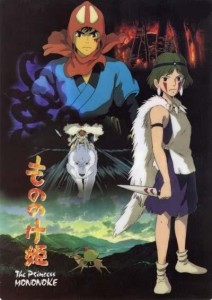
First released in Japan in 1997, and subsequently in the United States in 1999, Princess Mononoke follows Ashitaka, the last Emishi prince, who happens to be infected by a demon boar (later revealed to be a god) that attacks his village. He sets out to find a cure in the lands to the west.
Ashitaka is given to believe that he will find a cure from the Great Forest Spirit, and on his way to finding said spirit, he comes across Irontown, a small fortressed area lead by the strong-willed and fearless Lady Eboshi, who has trained the town’s women to fight the demon gods of the nearby forest. Ashitaka also inevitably meets San, the human girl raised by the wolf goddess, Moro. San is the real hero of this story, even though Ashitaka is technically the protagonist; this is one of the few Miyazaki films were a female character does not take the firm lead.
What is it about this movie that makes it stand out in the pantheon of Ghibli films? Why do most of my friends find resonance with this film more than any of the others? (Note: This is my second-favorite Miyazaki film; Kiki’s Delivery Service will always be my first.)
There are a multitude of answers to this question, I’m sure. But I have a few ideas of my own. To start out, the people who answered my plea were mostly people my age – early twenty-somethings who grew up during the great anime influx of the last couple decades. We have been exposed to anime almost seamlessly along with other entertainment, without entirely realizing that titles like Pokemon were somehow different from the other cartoons we watched. My friends, being well…my friends, probably also kind of have eclectic tastes.
I first watched Princess Mononoke when I was probably…oh, eleven or twelve years old, maybe. I had seen My Neighbor Totoro and Kiki’s Delivery Service, and I totally loved wolves, so I thought I more or less knew what to expect. But this film blew my mind in ways I didn’t know cartoon movies could. This was the very very first time I had ever seen a girl in a cartoon movie act so strong and mature and fierce – without being masculine, without concealing her emotions. That famous scene where San is sucking poisoned blood out of her wolf-brother’s shoulder and spitting it across the ground…it gave me chills. It still does! And that’s not the only scene that does that.
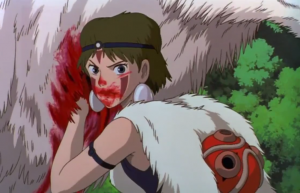
So I think one of the (many) beautiful, timeless things about Princess Mononoke is that for so many of us, it was the introduction to how cartoons didn’t have to be cute and sweet and funny all the time. It’s a serious film, with serious characters who struggle with ideas of morality and justice, and who ultimately learn to care for each other and for the place they live. For so many American viewers, it opened up the doors of what animation could be, and how female characters could be just as independent and headstrong and capable as male characters.
For those of you who haven’t seen Princess Mononoke yet – who either eschew Miyazaki’s cutesy girly work or who just haven’t been exposed – do yourself a favor and go for it. If you regret it, I would be surprised. The same man who brought you the Catbus and the adorable soot sprites also created a completely feral heroine who was literally raised by wolves and isn’t afraid to shed blood and protect what is just. This is not a movie I would show to younger kids (I wonder if even I was too young when I saw it, though I had seen Akira years before…), but young teenagers through adults will love the rich story and heady themes.






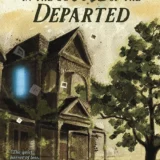

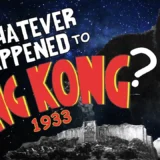
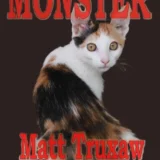
Recent Comments